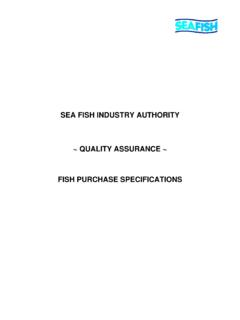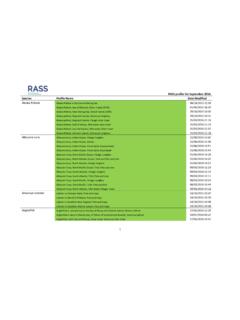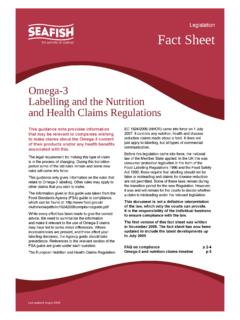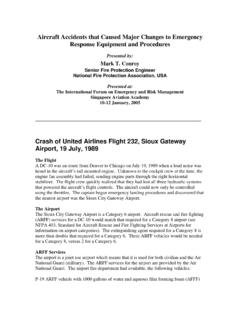Transcription of Drug abuse at sea - Seafish - Seafish
1 drug abuse at seaDrug abuse at seaContents Page 1 drug abuse 2 The safety implications 4 The legal implications 5 The benefits of a drug policy 6 Combating the menace of drugs 7 Legal considerations 12 Methods of drug testing 14 What to do in an emergency 17 Appendix Amphetamines 20 Cannabis 22 Cocaine 24 Crack 26 Ecstasy 27 Gases, glues and aerosols 28 GHB 29 Heroin 30 Ketamine 32 LSD 33 Methadone 34 Sedatives 35 AcknowledgementsWith thanks to:The Metropolitan Police Service London and Central Narcotics Bureau Singapore for photographsThe Nautical Institute for extracts from the book Illegal Drugs by Sea The recovery position illustration taken from the Ship Captain s Medical Guide 22nd edition, page 15 is Crown copyright and reproduced with the permission of the Controller of Her Majesty s Stationery OfficeDrug abuse at seaIntroductionOver the last few years we have seen an alarming increase in the number of accidents at sea in which drugs have been a causative factor.
2 In some areas of the world and on certain types of vessel drug abuse is becoming a serious safety hazard. The pattern of life at sea for many seafarers involves periods cut off from the diversions and entertainments enjoyed by those ashore. Periods of isolation and tedium induce a strong desire in many to party when they come ashore. Seafarers often pay off with large sums of cash either from their wages, or in the case of a fishing vessel, from their share of the catch. This combination of liquid assets and a thirst for excitement make them a target for various business ventures designed to part the seafarer from his money. In the past these have tended to revolve around alcohol and the opposite sex but now the seafarer has become an attractive target for drug it might be argued that the use of drugs whilst ashore on leave is no business of the shipowner, operator or employer, the argument does not stand up.
3 It has been shown that most drugs have long term effects which continue long after drug taking has ceased. It may also only be a matter of time before the seafarer develops such a taste for the drugs that he takes them to sea with most countries of the world the law imposes a duty on the shipowner, operator or employer to provide a safe place for the seafarer to work. This includes providing fellow crew members who are fit and capable of carrying out their duties safely. Seafarers who are under the influence of drugs clearly present a safety hazard for which an employer may find himself both civilly and criminally liable. The symptoms and effects of alcohol are widely known throughout the marine industry. The signs of drug abuse are not so well known, nor is there a widespread appreciation of the effects of various drugs on work performance, attitude and behaviour.
4 The purpose of this booklet is to help owners, operators and employers of seafarers to become aware of the risks, to educate them in the effects of drugs and help eradicate this menace from our abuseWhat is a drug ?A drug is any substance that alters the function of mind or is drug abuse ? abuse is the inappropriate taking of illegal or prescribed drugs, whether deliberate are the effects of drug abuse ? drug abuse at sea is a serious problem which not only affects the abuser but also the safety of his crewmates and indeed the vessel itself. When taken in excess the chemicals contained in drugs can cause both physical and mental harm to the abuser. Most drugs adversely affect physical co-ordination, making the abuser a danger to all around him whilst he remains under the influence of the drug . drug abuse alters the way a person thinks, perceives and feels, leading to impaired memory, judgement and concentration which can cause harm both to the abuser and to other people.
5 abuse may be accompanied by neglect in personal health and wellbeing and work performance usually suffers. Simultaneous use of drugs and alcohol is particularly suggest that within two years of developing a drug problem, a crew member s work performance will deteriorate to the extent where they become is at risk? drug abuse falls mainly into the 17-30 years old age can I tell if there is a drugs problem on board?There are no social divisions of class or classes of drug users. They may be found in all walks of life and at all social levels. The physical characteristics of drug addicts depends on the type of drug used and the time that has elapsed since the last dose. The drug user generally develops an ability to lie about his habit and keeps it secret. crew members may not notice a drug user amongst their colleagues.
6 In a closed community such as a ship s crew there may be a strong bond of group loyalty which may result in an unwillingness to believe the worst about a colleague. The only way of establishing with any degree of certainty whether there is a drugs problem on board your vessel is to embark on a drug testing programme. There are however a number of other indicators which might help identify those with a drug problem. These are:o Sudden unexplained mood changeso Unusual irritability and aggressiono Tendency to become confusedo Abnormal changes in concentrationo Poor job performanceo Poor timekeepingo Loss of short term memoryo Loss of interest in jobo Deterioration of relationships with fellow crewo Dishonesty and theft from boat or fellow crewo Unexplained changes in financial circumstances3 The safety implicationsSafe working practices are of prime importance on an efficient well run ship.
7 All drugs, including alcohol and prescribed drugs, may have side effects which increase the risk of accidents on board. The effects of a drug may not be limited to the time immediately after it is taken. Even in moderate doses some drugs remain in the body and affect the user for hours or days. Slow reaction times, poor co-ordination and loss of memory caused by drugs can turn everyday tasks into a nightmare for the affected person and seriously increase shipboard hazards, not only for the drug abuser but for everyone involved in vessel legal drugs can adversely affect crew performance and can be potentially just as dangerous as illegal drugs. Companies should encourage and require crew members to advise the company of any medication they are taking that has been prescribed by their doctor. This is particularly important because certain prescribed drugs may also give a positive result in a drugs sea everyone is responsible, not only for their own safety, but the safety of others.
8 It is in everyone s interest that drug abuse be eliminated from every part of marine and safety don t mix4 The legal implicationsThe possession of some drugs is illegal, exposing the user to risk of criminal charges as well as causing harm to his psychological and physical health. If found on board ship they may expose the owner/operator to criminal you knowingly permit the possession, trafficking or use of illegal substances to take place on your ship, you could be committing a criminal you knowingly allow an employee under the influence of drugs to continue working you may be prosecuted, especially if his behaviour places others at you knowingly allow an employee under the influence of drugs to continue working and that employee causes an accident, you will be liable for any damage or injury which discovery of illegal drugs on board a vessel by customs officers can result in the vessel being detained and the owners or operators being fined.
9 In extreme cases the vessel itself may be confiscated. drug users are more likely to be tempted into becoming involved in smuggling operations as a means of financing their expensive habit. Smuggling activities clearly increase the risk of a shipowner or operator being fined or having his vessel you afford this risk?5 The benefits of a drug policySuccessfully tackling drug abuse is beneficial to crew safety and the vessel s earning power:o By reducing the risk and cost of accidents caused by impaired judgemento By reducing the cost of absenteeism or poor work performance of the drug abusero By saving on the cost and inconvenience of recruiting and training replacement crew when drug abusers become unreliableo By reducing the possibility of fines and vessel detentiono By improving crew moraleo A drug and alcohol policy has been proven to attract a higher quality of job applicantTackling a drug problem saves money6 Combating the menace of drugsWhat can I do?
10 You should:o Devise and implement a written policy on drugso Implement a prevention and education programme to provide the seafarer with clear factual information about the nature of drugs, the short and long term effects of their use and the implications for the seafarer and personal safety on board shipo Introduce a drugs and alcohol clause to your seafarer s contract of employmento Implement a drug screening/ testing programmeMany industries have developed systems of drug screening and testing to combat drug abuse in the workplace. Until relatively recently testing in the marine industry was uncommon however within the last 15 years it has become accepted practice, particularly in the oil related trades where the oil companies have instituted drug and alcohol clauses in yet there is no widespread use of drug testing in the fishing industry but in response to an increasing drug problem amongst fishermen some operators in America, Canada, New Zealand and other parts of the world have successfully implemented screening and testing programmes.











